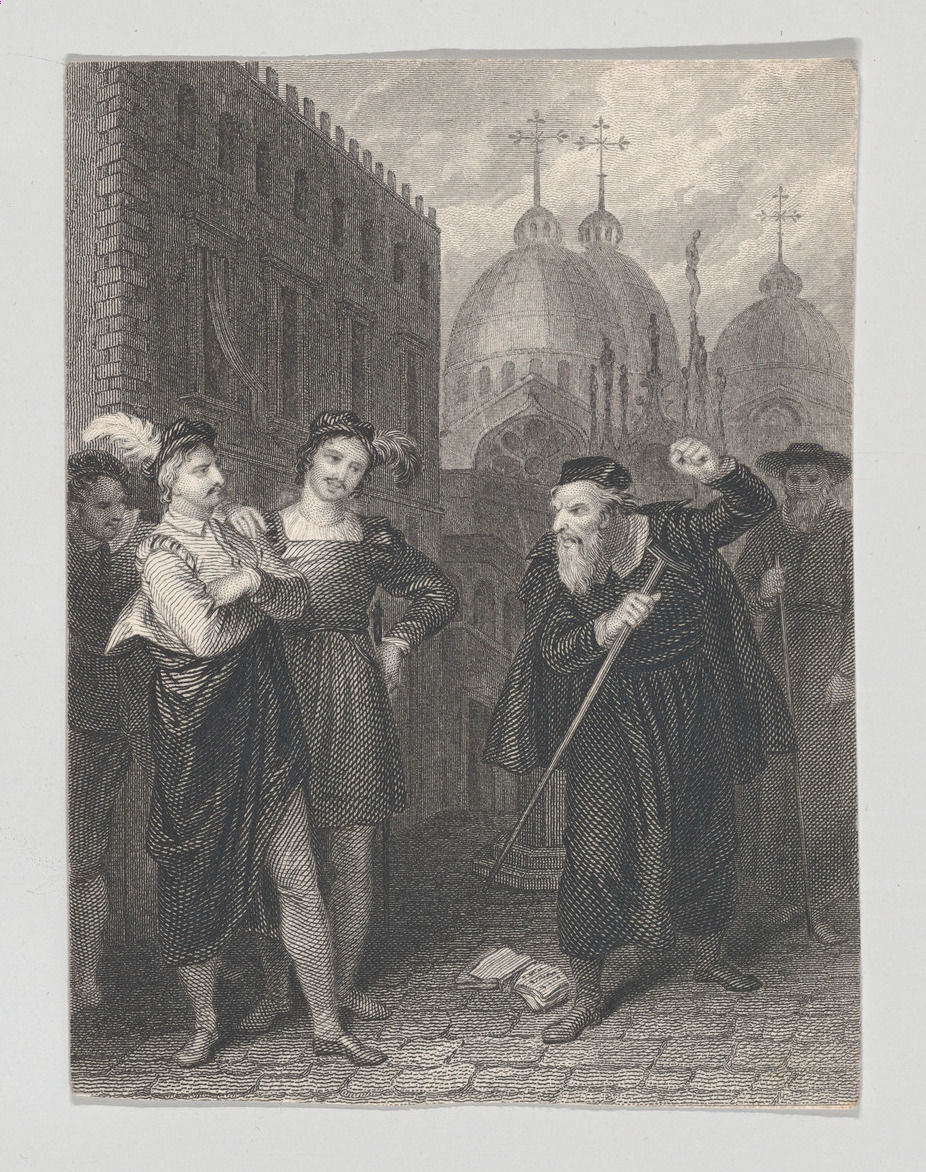Part of our series exploring the Merchant of Venice, this study note contains summary and analysis of Act 3 Scenes. Antonio's fate seems sealed as his ships wreck and he is arrested whilst Bassanio wins Portia's hand.
Pinned to
2745
0
0
No tags specified

|
Created by Antonia Blankenberg
almost 8 years ago
|
|
Rate this resource by clicking on the stars below:




 (0)
(0)
Ratings (0)
| 0 | ||
| 0 | ||
| 0 | ||
| 0 | ||
| 0 |
0 comments
There are no comments, be the first and leave one below:
Close
9579499
note
2018-10-03T15:15:00Z
1/5
Act 3 - Scene 1
- Act 3 opens with Salarino and Solanio discussing rumours that another one of Antonio's ships has been wrecked.
- Shylock enters and lashes out at both of the men, accusing them of being involved with Jessica's elopement. The two men proudly take credit for their role in Jessica’s elopement and mock him for his metaphor when he complains that his "flesh and blood" has rebelled.
- Shylock confirms that Antonio's ship has wrecked and is determined to collect his bond from Bassanio's loan and take revenge on Antonio. Shylock says Antonio has mistreated him solely because he is a Jew, but now he is determined to apply the lessons of hatred and revenge that Christian intolerance has taught him.
- A servant enters then and informs Solanio and Salarino that Antonio wishes to see them at his house. They depart as Tubal, a friend of Shylock, enters. Tubal announces that he was unable to find Jessica and rages against his daughter, and he wishes her dead as he bemoans his losses. He becomes particularly angry when Tubal reports that Jessica has taken a ring that was given to Shylock in his youth by a woman named Leah (presumably Jessica’s mother) and has traded that ring for a monkey.
- Tubal reminds Shylock of Antonio's recent bad luck and Shylock becomes happy again. Tubal assures Shylock that Antonio's credit is ruined. Shylock agrees and instructs Tubal to pay a police sergeant in advance to arrest Antonio if he forfeits the bond.
Analysis:
- The passage of time in The Merchant of Venice is peculiar. In Venice, the three months that Antonio has to pay the debt go by quickly, while only days seem to pass in Belmont. Shakespeare juggles these differing chronologies by using Salarino and Solanio as a Chorus device to fill in the missing time.
- The news of danger to Antonio's ships prepares foreshadows the entrance of Shylock, the embodiment of that danger, who has by now discovered Jessica's elopement.
- The malicious digs of Solanio and Salarino produce one of Shylock's most dramatic speeches in the play. In the speech, which is written in prose, Shylock's series of accusing, rhetorical questions (from "Hath not a Jew eyes?" to "If you poison us, do we not die?") completely silences Shylock's tormentors.
- Shylock begins his speech by eloquently reminding the Venetians that all people, even those who are not part of the majority culture, are human too. A Jew is the same as a Christian, and is subject to the same pains and comforts and emotions. However, the speech is not a celebration of shared experience. Instead of using reason to elevate himself above his tormenters, Shylock delivers a monologue that allows him to sink to their level: he plans to behave as villainously as they have. The audience is not meant to sympathise entirely with Shylock: he may have been wronged, but he lacks mercy. By the end of the scene, the audience is convinced that Shylock's attack on Antonio will be absolutely relentless.
Important Quotes:
- "I am a Jew. Hath not a Jew eyes? Hath not a Jew hands, organs, dimensions, senses, affections, passions; fed with the same food, hurt with the same weapons, subject to the same diseases, healed by the same means, warmed and cooled by the same winter and summer as a Christian is? If you prick us do we not bleed? If you tickle us do we not laugh? If you poison us do we not die? And if you wrong us shall we not revenge? If we are like you in the rest, we will resemble you in that. If a Jew wrong a Christian, what is his humility? Revenge. If a Christian wrong a Jew, what should his sufferance be by Christian example? Why, revenge. The villainy you teach me I will execute, and it shall go hard but I will better the instruction. " - Shylock
- " I would my daughter were dead at my foot and the jewels in her ear! Would she were hearsed at my foot and the ducats in her coffin! " - Shylock

